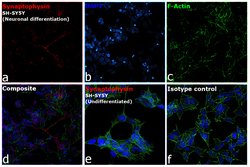Learn More
Invitrogen™ Synaptophysin Monoclonal Antibody (EP10), eFluor™ 660, eBioscience™
Mouse Monoclonal Antibody
Supplier: Invitrogen™ 50652582

Description
Description: This EP10 monoclonal antibody reacts with human Synaptophysin, which is also known as Major Synaptic Vesicle Protein p38. This 38-kDa integral membrane protein is expressed on neuronal presynaptic vesicles in the brain, spinal cord, retina, neuromuscular junctions, and adrenal medulla. Synaptophysin is also expressed in neuroendocrine tumors and neuroblastomas. Synaptophysin has been reported to play a role in synaptic vesicle trafficking. The EP10 antibody recognizes human and hamster synaptophysin but does not recognize mouse and rat synaptophysin. Applications Reported: This EP10 antibody has been reported for use in immunohistochemical staining, and immunocytochemistry. Applications Tested: This EP10 antibody has been tested by immunohistochemistry on FFPE human tissue using low pH antigen retrieval at less than or equal to 10 μg/mL. It is recommended that the antibody be carefully titrated for optimal performance in the assay of interest. eFluor® 660 is a replacement for Alexa Fluor® 647. eFluor® 660 emits at 659 nm and is excited with the red laser (633 nm). Please make sure that your instrument is capable of detecting this fluorochome. Excitation: 633-647 nm; Emission: 668 nm; Laser: Red Laser. Filtration: 0.2 μm post-manufacturing filtered.
Synaptophysin is a calcium-binding and integral membrane glycoprotein present in presynaptic vesicles in almost all neurons. Synaptophysin has four transmembrane domains and it forms a complex with dynamin at high calcium concentrations suggesting an involvement in synaptic vesicle endocytosis. It is also involved in the regulation of short-term and long-term synaptic plasticity. Synaptophysin is currently the most widely used marker for nerve terminals and for differentiating neuroendocrine tumors. Mutations in the gene can result in mental retardation, X-linked 96.
Specifications
| Synaptophysin | |
| Monoclonal | |
| 0.2 mg/mL | |
| PBS with 0.09% sodium azide; pH 7.2 | |
| P08247 | |
| Syp | |
| Affinity Chromatography | |
| RUO | |
| 100758282, 6855 | |
| 4°C, store in dark, DO NOT FREEZE! | |
| Liquid |
| Immunohistochemistry (Paraffin), Immunocytochemistry | |
| EP10 | |
| eFluor 660 | |
| Syp | |
| A230093K24Rik; AI848995; BM89 antigen; I79_012252; Major synaptic vesicle protein p38; MRX96; MRXSYP; p38; Syn; Synaptophysin; Syp; Syp I; Syp1 | |
| Mouse | |
| 100 μg | |
| Primary | |
| Human, Hamster | |
| Antibody | |
| IgG1 κ |
The Fisher Scientific Encompass Program offers items which are not part of our distribution portfolio. These products typically do not have pictures or detailed descriptions. However, we are committed to improving your shopping experience. Please use the form below to provide feedback related to the content on this product.

